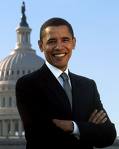Obama ‘is elected US president’

BBC Report at 23.00 EST
Democratic Senator Barack Obama has been elected the first black president of the United States, according to projected results.
He is projected to have won enough states to guarantee that he has beaten Republican rival John McCain.
He has so far held most of the states that voted Democrat in 2004, as well as seizing at least four from the Republicans.
Several other key swing states are hanging in the balance.
In Indiana and North Carolina, with most of the vote counted, there was less than 0.5% between the two candidates.
However, the popular vote remains close. At 0345 GMT it stood at 50.7% for the Democratic Senator from Illinois, against 48.2% for Arizona Senator McCain.
Mr Obama captured the key battleground states of Pennsylvania and Ohio, before passing the essential figure of 270 electoral college votes at 0400 GMT, when projections showed he had also taken California and a slew of other states.
The main developments include:
- Mr Obama is projected to have seized Ohio, New Mexico, Iowa and Virginia – all Republican wins in 2004.
- He is also projected to have won: Vermont, New Hampshire, Pennsylvania, Illinois, Delaware, Massachusetts, District of Columbia, Maryland, Connecticut, Maine, New Jersey, Michigan, Minnesota, Wisconsin, New York, Rhode Island.
- Mr McCain is projected to have won: Kentucky, South Carolina, Oklahoma, Tennessee, Arkansas, Alabama, Kansas, North Dakota, Wyoming, Georgia, Louisiana, West Virginia, Texas, Mississippi, Utah.
- Turnout was reported to be extremely high – in some places “unprecedented”.
- The Democrats made early gains in the Senate race, seizing seats from the Republicans in Virginia, North Carolina, New Hampshire and New Mexico.
- Exit polls suggest the economy was the major deciding factor for six out of 10 voters.
- Nine out of 10 said the candidates’ race was not important to their vote, the Associated Press reported. Almost as many said age did not matter.
Several states reported a high turnout. It was predicted 130 million Americans, or more, would vote – more than for any election since 1960.
Many Americans said they felt they were voting in a historic election, not least because of the possibility of choosing the first African-American president.
Faton Fall, 40, a black voter queuing at a Baptist church in Chicago, said: “It means a lot to me. I’m overwhelmed. I can’t say more.”
Congressional race
There are also elections to renew the entire US House of Representatives and a third of US Senate seats.
Democrats are expected to expand majorities in both chambers.
They need to gain nine Senate seats to reach a 60-seat majority that would give them extra legislative power.
In the presidential vote, under the US Electoral College system, states are allocated votes based on their representation in Congress.
In almost every state, the winner gets all these college votes.
To become president, a candidate needs to win a majority across the country – 270 college votes out of a possible 538.
The presidential election has been the most expensive in US history – costing $2.4bn, according to the non-partisan Center for Responsive Politics.

